How a rugby star swapped sport for coffee shops
- Published
Former Australian rugby union captain George Gregan looks back on his time in the game, and how he built up a food and hospitality business.
As one of Australia's most recognised sportsmen, the sight of rugby union international George Gregan counting the number of commuters walking out of a busy Sydney railway station must have raised some eyebrows.
This was back in 1998, one year before Mr Gregan helped the Wallabies to win the Rugby World Cup.
At the time the scrum-half was at the peak of his physical powers, and earning a sizeable income from endorsements on top of his rugby salary.
Yet there he was, a poster boy for Australian sport, calculating the number of people emerging from the morning rush-hour swell at Wynyard station near the Sydney Harbour Bridge and Opera House.
Renowned as a great tactical mind on the rugby pitch, a player who always did his homework on his opponents, Mr Gregan was there that day to apply the very same principles to a new part of his life - setting up a business.
Aware that his rugby career would not go on forever, Mr Gregan - together with his wife Erica - had decided to open a coffee shop.
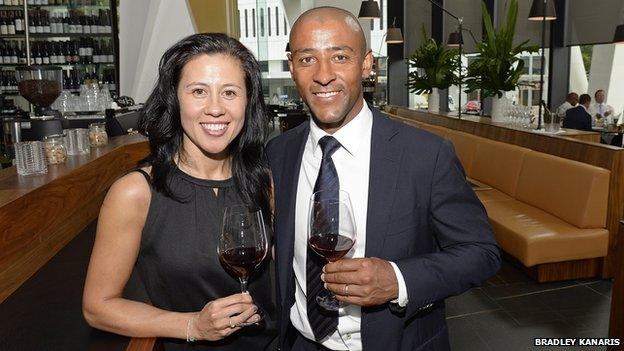
Mr Gregan's wife Erica is in day-to-day charge of the business
One of the vacant premises they had their eyes on was outside Wynyard station, in the city's central business district.
So doing his background checks, Mr Gregan was working out the exact level of passing trade. Happy with the numbers, the first GG Espresso shop opened in 1999.
Fast forward to today and there are now 16 GG Espresso cafes across Sydney, which are part of a wider food and hospitality business owned by the Gregans.
Called the Gregan Group, it enjoys annual revenues of more than 10 million Australian dollars ($7.3m; £4.7m), and employs 280 people.
'Very driven'
Mr Gregan, 42, happily admits that being a celebrity helped the business back in its early days, but adds that the boost is only limited.
"It was great for a bit of publicity, but that only goes so far," he says. "There's a bit of noise initially, then you have to deliver.
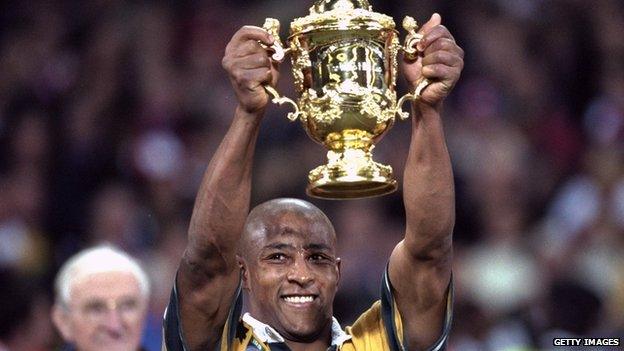
George Gregan helped Australian to win the 1999 Rugby World Cup
"It all comes down to performance, and making sure you are consistent, particularly in coffee, because people will walk [somewhere else], particularly now.
"They'll walk another block or two to get the coffee made right, and the coffee they expect."
While Mr Gregan, who hung up his rugby boots for the last time in 2011, had almost no business experience when the first coffee shop opened, crucially his wife did.
Erica had extensive experience of working in the hotels and restaurant sectors.
And so to this day, she is the managing director of the Gregan Group, and takes the lead role in the day-to-day running of the Sydney-based business.
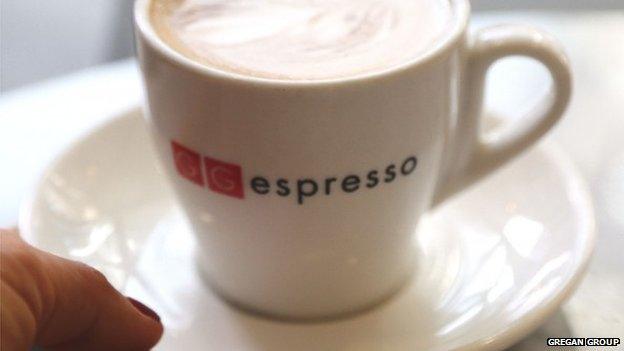
There are now 16 branches of the coffee business
Meanwhile, while Mr Gregan also takes an active role in leading the business, he balances this with his other work as a rugby commentator.
He says: "My wife is very driven. If you ever met her, she is very good at opening shops, and is really keen to do it well, and have a consistency in the level of our service."
While the couple's business now extends to bars, restaurants and a catering company, they say they grew it slowly, and using their own money.
The only part of the Gregan Group that has outside investors are the two branches of its "Local Bar" brand, which have opened since 2011. The Gregans says this investment has come from "close friends" rather than any financial institution.
'Judged on results'
Born in Zambia to a Zimbabwean mother and Australian father, Mr Gregan's family moved to Australia when he was still a baby, settling in the capital Canberra.
He says his family helped install his drive and determination to succeed, be it in rugby or business.
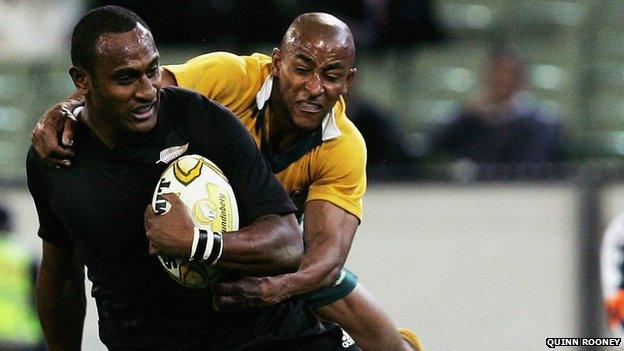
George Gregan was renowned as a tough player
"My father had his own pharmacy when I was young, but he sold it off and worked for the government in the health department. My mum was a working nurse.
"They worked really hard, so they had a strong work ethic, and I think that always rubs off on you.
"They certainly installed that within me, and they've always been great supporters."
But how does Mr Gregan - who with 139 caps for Australia remains the joint second most-capped international rugby player - find running a business compares with his old sport?
He says: "You are never going to replicate what the work space was when you were a professional sportsman.
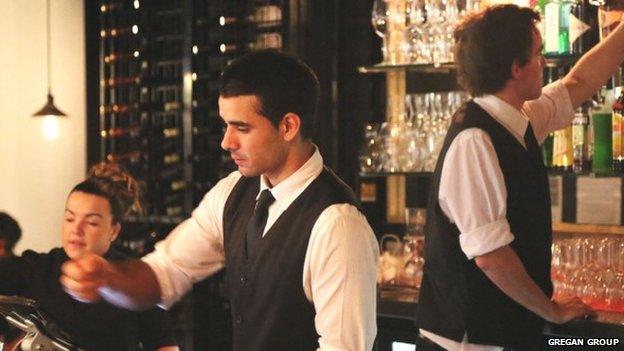
The Gregan Group now owns a number of bars
"I had upwards of 60,000 people seeing what I did, watching every mistake you make.
"Yeah, they'd clap and see things you did well, but in a lot of ways you are naked because you are there for everyone to see, there is nowhere to hide."
Mr Gregan adds: "In a business you will be judged on results, but not every single eyeball is going to be on what you do. But still, the ability to perform is really critical when it comes to both sport and business."
While not every star sportsman can go on to be a hit in business,. Mr Gregan thinks many can be taught how to successfully run a company.
"One thing all elite athletes are pretty good at is getting coached, because they have to be coached, so they are good at listening to instructions.
"They are good at deciphering what is important, and what is not."
Whether retired professional sportsmen or women go into business, or do something else with their lives, Mr Gregan says it is vital that they have a structure to their days and weeks, and a challenge to overcome, to avoid feeling cast adrift.
"It is really important to get involved in business or in a venture which provides that sort of challenge," he says. "I like to have things on the horizon.
"I'm big on shared experience with good people, so you work hard but you have a bit of laughter along the way. Otherwise, what do you live for?"